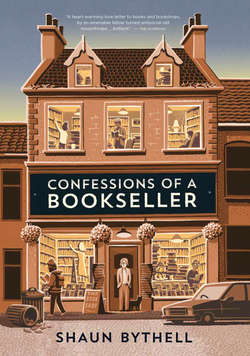Читать книгу Confessions of a Bookseller - Shaun Bythell - Страница 5
На сайте Литреса книга снята с продажи.
January 2015
ОглавлениеHe handled the books with the reverence of a minister opening the pulpit bible. I had polished the leather that morning till it gleamed like silk, and Mr Pumpherston’s finger-tips rested upon it as if they were butterflies alighting on a choice flower. He seemed to purr with pleasure at the contact. The visitor adjusted his spectacles before he turned over the pages and one could see that Mr Pumpherston’s delight was infectious.
Augustus Muir, The Intimate Thoughts of John Baxter, Bookseller (Methuen & Co., London, 1942)
When Augustus Muir wrote his spoof diary of John Baxter, I wonder if he was truly aware that this is undoubtedly the best part of the second-hand book trade, and probably of book-collecting too: finding and handling something rare and important. I once had a two-volume set of Francis Grose’s Antiquities of Scotland, which, to the person who bought it, was the most important book imaginable. Grose and Robert Burns met in 1789 and became friends. Grose asked Burns to write a supernatural tale to accompany an illustration of Auld Alloway Kirk in Antiquities of Scotland, which he was researching at the time, and thus was born perhaps Burns’s finest poem, ‘Tam o’ Shanter.’ Although it appeared in two other publications first, Grose’s Antiquities of Scotland was the first book in which the poem appeared, and while it is not of enormous financial worth (the last set I had I sold for £340), it is an important book to devotees of Burns, in part owing to the fact that Burns might well never have written ‘Tam o’ Shanter’ had it not been for Grose’s commission. The customer to whom I sold my copy had travelled down from Ayr when he’d heard from one of his friends that we had a copy. It was only after he’d paid that he told me of the Robert Burns connection, and had he not, I would probably still be ignorant of the fact to this day. It is an irony of my position that—although I’m surrounded by books every day—most of what I know about them is imparted by customers, the self-same customers whom my first instinct is to discourage from talking.
Muir’s description of the way Mr Pumpherston handles the book also resonates: people who deal with rare books regularly visibly handle them differently, making sure to support the boards when opening them so that the hinges don’t split, making sure that when the book is removed from the shelf there isn’t too much pressure on the headband. Once you’ve been around rare books for a while, you become acutely aware of people mishandling them.
The pleasure derived from handling books that have introduced something of cultural or scientific significance to the world is undeniably the greatest luxury that this business affords, and few other walks of life—if any—provide such a wealth of opportunity to indulge in this. This is why, every morning, getting out of bed is not in anticipation of a repetitive drudge but in expectation that I may have the chance to hold in my hands a copy of something that first brought to humanity an idea that changed the course of history, whether it be a 1791 copy of The Rights of Man, the 1887 English translation of Das Kapital or an early edition of Darwin’s 1859 On the Origin of Species by Means of Natural Selection. This is what it’s all about.
